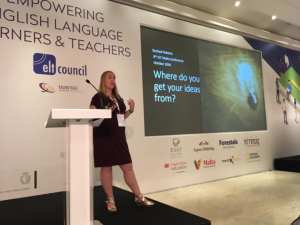 In the first of our mini-series of blog posts from the 8th Malta ELT conference, Rachael Roberts explores where materials writers find inspiration. The Malta ELT conference was held over the weekend of 18–20 October 2019.
In the first of our mini-series of blog posts from the 8th Malta ELT conference, Rachael Roberts explores where materials writers find inspiration. The Malta ELT conference was held over the weekend of 18–20 October 2019.
The author Neil Gaiman once said:
Doctors are always being asked for free medical advice, lawyers are asked for legal information, morticians are told how interesting a profession that must be and then people change the subject fast. And writers are asked where we get our ideas from.
While not in any way comparing myself to the great Neil Gaiman, as a coursebook writer, I have indeed been asked this many times. Usually by publishers, who seem to think that there is some great secret treasure trove.
There isn’t. I do have a few favourite places to find ideas: podcasts, YouTube, newspapers. But, while I keep an eye out for interesting topics and texts, most often I start with a topic, then search online for something fresh connected with it.
Perhaps the first thing I’m looking for is what is sometimes called the ‘watercooler factor’: is the topic interesting enough that students will go and discuss it after class with their friends and family? But this isn’t the only factor to consider. Sometimes a topic can be intrinsically interesting, even to the students we’re aiming it at, but still not make a good lesson.
It’s vital that, as well as constituting interesting input, the topic or text also lends itself to interesting output. So we need to ask ourselves if students can relate it to their lives, and if there is sufficient mileage to look at it from a few different angles.
Ultimately, a great text or topic can still make a dull or unhelpful lesson. I still remember clearly a lesson I observed in which the class took three hours to plough through an interesting and relevant, but wildly difficult, authentic newspaper text.
So, we need to consider how suitable the text is in terms of the language it contains. We should not only look at the level, but we should also think about what language stands out from the text, which students could then use in output. Or, if we are writing the text ourselves and have a particular language focus in mind, we should ask ourselves how naturally that fits into the context and genre. We can also consider what skills it might enable students to develop, and how to combine these with language work.
Last, but very much not least, we need to think carefully about the tasks, and how to make them user-friendly and effective.
Clearly, this is where a great deal of the skill of materials writing lies, but, to give an example, here are some common pitfalls with comprehension questions: asking questions (1) that can be answered through knowledge of the world, rather than through an understanding of the text, (2) that use exactly the same words as those in the text – therefore not actually requiring any understanding or (3) that only focus on one small part of the text.
 Creating materials is, in my opinion, both an art and a science and, while it certainly requires creative ideas, it also requires a good deal of experience and attention to detail. The best way to learn, however, is to do it, and to get feedback from your students and from other colleagues who try out your lessons.
Creating materials is, in my opinion, both an art and a science and, while it certainly requires creative ideas, it also requires a good deal of experience and attention to detail. The best way to learn, however, is to do it, and to get feedback from your students and from other colleagues who try out your lessons.
Since 1989, Rachael Roberts has worked in Portugal, Brazil, Poland and the UK as a teacher, teacher trainer and materials writer. She has written various titles for Pearson, Macmillan and OUP, among others. In her free time she enjoys language learning, meditation, and walking her small fluffy dog, Teddy. She was MaWSIG Coordinator from 2015 to 2018 and previously Deputy Events Coordinator from 2013 to 2015.

Increasingly, when I’m looking for ideas for a topic to go along with a language point, I try corpus searches. So, I search for a particular grammatical structure/language pattern and see what contexts come up. A few times it’s prompted topics I possibly wouldn’t have thought of, including weather forecasts for those odd future tenses (by midday day the rain will be moving into the east/by 6pm the rain will have cleared from most areas) and a whole load of others I can’t think of off the top of my head but I should probably collect …